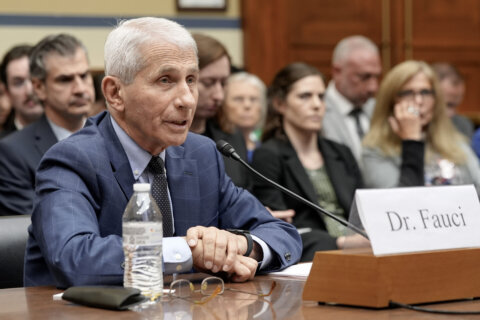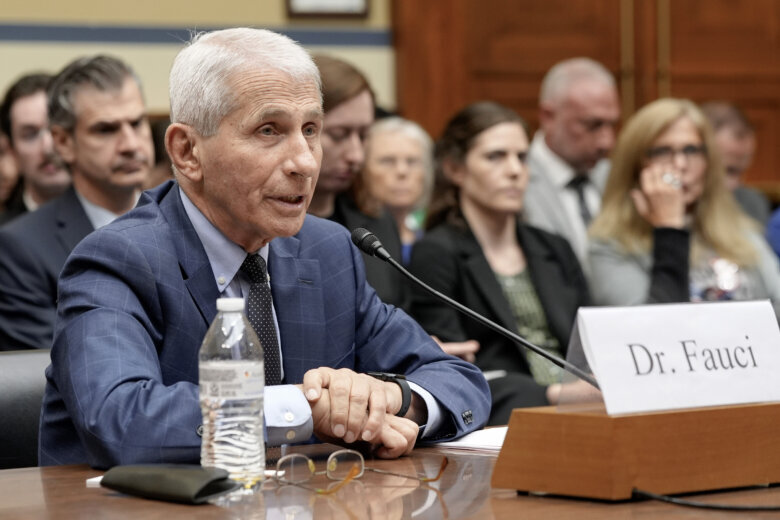Former Chief Medical Advisor to the President Anthony Fauci joined WTOP on Wednesday to discuss his public health career, including what he says it was like to head up the COVID-19 pandemic response during former President Donald Trump’s administration.

Fauci led the National Institutes of Allergy and Infectious Diseases for 38 years until he retired in 2022. Now, he’s telling his side of the story in a new autobiography titled “On Call: A Doctor’s Journey in Public Service.”
Listen to the interview or read the transcript below. The transcript has been lightly edited for clarity.
Dr. Anthony Fauci: There are a lot of lessons that you learn as you go from one crisis of a pandemic outbreak to another. The thing that really started it all off for me was more than 40 years ago, in the early 1980s, when I had to deal with the emerging pandemic of HIV/AIDS. And there were so many lessons learned, everything from the importance of the investment in basic and clinical research that allowed us to go from a disease that was almost uniformly fatal to the development of drugs that, now, when used in combination, have completely transformed the lives of persons with HIV to the point where now if they put themselves on medications early in the course of the disease, they can live essentially a normal life span.
That is one of the major, I would say, advances in biomedical research in recorded history. Also an understanding of the importance of dealing with the community, like the AIDS advocacy groups, the people who were activists during the early years, who got the government, both the scientific community and the regulatory community, to realize how important it is to embrace those individuals who are impacted by an outbreak.
So HIV/AIDS is a very important part of my story. It goes back well over 40 years, we had Ebola and Zika, and pandemic flu and the anthrax attacks, all of which taught us important lessons to prepare us for the extraordinary experience we had with COVID.
Anne Kramer: Dr. Fauci, your book is getting a lot of attention because you’re revealing for the first time your dealings with former President Trump during that first year of the COVID crisis. You give him credit for basically shutting down the country for a couple of weeks to try to slow things down. But as the pandemic dragged on, your relationship with Trump unraveled. How did you deal with having to sometimes contradict the president, either privately or publicly, when he said or did things you thought were wrong?
Dr. Anthony Fauci: Well, it was not easy because it was very painful to publicly disagree and contradict the President of the United States, since I have a great deal of respect for the office of the presidency of the United States. But as you mentioned, early on, we had a very good relationship. And he went along with many of the things that we suggested that were important to preserve and protect the health of the American public. But he wanted desperately for this outbreak to end and end quickly the way influenza does.
At the end of February, the beginning of March and the end of March, he wanted it to go away, because we were entering into the election cycle. When it didn’t go away, he began saying things that just were, frankly, not true, like it would disappear like magic. And when that didn’t happen, he would say other things that were not true, like hydroxychloroquine would be a cure when in fact, there was no evidence to believe that it would work. And there was some evidence to indicate that it could be harmful.
So when he said that, I had to make the difficult decision to essentially publicly contradict what he said. I did that because I needed to preserve my own professional integrity, but also, more importantly, because I felt an obligation to the American public to tell them the truth. Because my full responsibility is not to any administration, but it’s to the American public. But it was not a happy experience. It was painful for me to do that, even though I was convinced it was the right thing to do.
Shawn Anderson: What were your feelings when you became the target of personal attacks by other members of the Trump administration?
Dr. Anthony Fauci: Well, that was unfortunate, but not unexpected when you have a group of people that were just fiercely loyal, in many respects, to an unreasonable degree to President Trump. And when I had to come forth and publicly contradict him, I became the target of their ire. And they tried desperately to discredit me, even though the president himself wasn’t particularly doing that. He tried to maintain a good relationship with me, which lasted for many months thereafter. Only until the very end did it deteriorate, but it was mostly his staff that became infuriated with me because I was telling the truth.
Get breaking news and daily headlines delivered to your email inbox by signing up here.
© 2024 WTOP. All Rights Reserved. This website is not intended for users located within the European Economic Area.








